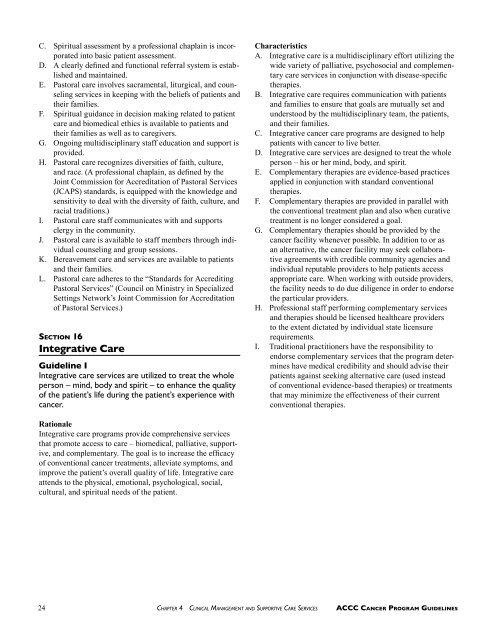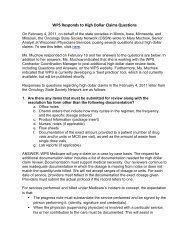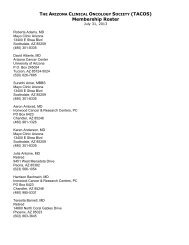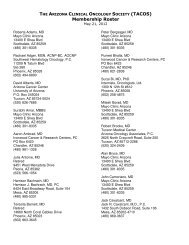Cancer Program Guidelines - Association of Community Cancer ...
Cancer Program Guidelines - Association of Community Cancer ...
Cancer Program Guidelines - Association of Community Cancer ...
Create successful ePaper yourself
Turn your PDF publications into a flip-book with our unique Google optimized e-Paper software.
C. Spiritual assessment by a pr<strong>of</strong>essional chaplain is incorporated<br />
into basic patient assessment.<br />
D. A clearly defined and functional referral system is established<br />
and maintained.<br />
E. Pastoral care involves sacramental, liturgical, and counseling<br />
services in keeping with the beliefs <strong>of</strong> patients and<br />
their families.<br />
F. Spiritual guidance in decision making related to patient<br />
care and biomedical ethics is available to patients and<br />
their families as well as to caregivers.<br />
G. Ongoing multidisciplinary staff education and support is<br />
provided.<br />
H. Pastoral care recognizes diversities <strong>of</strong> faith, culture,<br />
and race. (A pr<strong>of</strong>essional chaplain, as defined by the<br />
Joint Commission for Accreditation <strong>of</strong> Pastoral Services<br />
(JCAPS) standards, is equipped with the knowledge and<br />
sensitivity to deal with the diversity <strong>of</strong> faith, culture, and<br />
racial traditions.)<br />
I. Pastoral care staff communicates with and supports<br />
clergy in the community.<br />
J. Pastoral care is available to staff members through individual<br />
counseling and group sessions.<br />
K. Bereavement care and services are available to patients<br />
and their families.<br />
L. Pastoral care adheres to the “Standards for Accrediting<br />
Pastoral Services” (Council on Ministry in Specialized<br />
Settings Network’s Joint Commission for Accreditation<br />
<strong>of</strong> Pastoral Services.)<br />
Section 16<br />
Integrative Care<br />
Guideline I<br />
Integrative care services are utilized to treat the whole<br />
person – mind, body and spirit – to enhance the quality<br />
<strong>of</strong> the patient’s life during the patient’s experience with<br />
cancer.<br />
Characteristics<br />
A. Integrative care is a multidisciplinary effort utilizing the<br />
wide variety <strong>of</strong> palliative, psychosocial and complementary<br />
care services in conjunction with disease-specific<br />
therapies.<br />
B. Integrative care requires communication with patients<br />
and families to ensure that goals are mutually set and<br />
understood by the multidisciplinary team, the patients,<br />
and their families.<br />
C. Integrative cancer care programs are designed to help<br />
patients with cancer to live better.<br />
D. Integrative care services are designed to treat the whole<br />
person – his or her mind, body, and spirit.<br />
E. Complementary therapies are evidence-based practices<br />
applied in conjunction with standard conventional<br />
therapies.<br />
F. Complementary therapies are provided in parallel with<br />
the conventional treatment plan and also when curative<br />
treatment is no longer considered a goal.<br />
G. Complementary therapies should be provided by the<br />
cancer facility whenever possible. In addition to or as<br />
an alternative, the cancer facility may seek collaborative<br />
agreements with credible community agencies and<br />
individual reputable providers to help patients access<br />
appropriate care. When working with outside providers,<br />
the facility needs to do due diligence in order to endorse<br />
the particular providers.<br />
H. Pr<strong>of</strong>essional staff performing complementary services<br />
and therapies should be licensed healthcare providers<br />
to the extent dictated by individual state licensure<br />
requirements.<br />
I. Traditional practitioners have the responsibility to<br />
endorse complementary services that the program determines<br />
have medical credibility and should advise their<br />
patients against seeking alternative care (used instead<br />
<strong>of</strong> conventional evidence-based therapies) or treatments<br />
that may minimize the effectiveness <strong>of</strong> their current<br />
conventional therapies.<br />
Rationale<br />
Integrative care programs provide comprehensive services<br />
that promote access to care – biomedical, palliative, supportive,<br />
and complementary. The goal is to increase the efficacy<br />
<strong>of</strong> conventional cancer treatments, alleviate symptoms, and<br />
improve the patient’s overall quality <strong>of</strong> life. Integrative care<br />
attends to the physical, emotional, psychological, social,<br />
cultural, and spiritual needs <strong>of</strong> the patient.<br />
24 Chapter 4 Clinical Management and Supportive Care Services ACCC <strong>Cancer</strong> <strong>Program</strong> <strong>Guidelines</strong>
















